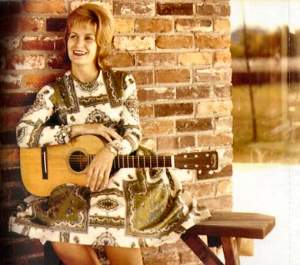DAVE'S DIARY - 21 SEPTEMBER 2004 - SKEETER DAVIS RIP
SKEETER DAVIS RIP AT 72
BORN
MARY FRANCES PENICK - Dry Ridge, Kentucky, December 30, 1931
DIED NASHVILLE, TENNESSEE, September 19, 2004.
BUS FARE TO KENTUCKY
|
Skeeter Davis |
Skeeter
Davis's life reads like a sad country song - she was the eldest
of seven children in a dirt-poor Kentucky farming family and hit
many hurdles on her ascent to fame. The singer first flirted with death when she was critically injured in a 1953 car crash that killed her first singing partner Betty Jack Davis. |
Skeeter and
Betty recorded and performed as The Davis Sisters before the accident.
But the tragedy didn't end the Davis Sisters - Skeeter continued performing
under that name with Betty's sister Georgia.
Too weak
to sing, she took to the stage to update her fans on her condition and
thank them for their support.
Davis had been diagnosed with breast cancer in 1988 and had a recurrence
in 1996.
It all ended September 19 when Skeeter succumbed in a Nashville hospice
The curtain finally fell on Skeeter who topped country and pop charts
and toured with artists diverse as Elvis, Hank Snow, Rolling Stones and
a raft of acts that she recorded duet albums with.
Skeeter was a pioneer female country vocalist long before Loretta, Dolly
and Tammy.
Her album duet partners included Bobby Bare, country comic Don Bowman
(Shotgun Willie Nelson's opening act on his 1981 Australasian tour), Porter
Wagoner and many more.
She also made a brace of tribute discs - Waylon Jennings played bass on
her 1967 Buddy Holly eulogy.
Others to benefit from her tributaries included Dolly Parton and Flatt
& Scruggs.
BUZZING FROM DRY RIDGE
Davis said
her grandfather named her Skeeter because she was "always buzzing
from one place to another."
She grew up on a farm, the first of seven children.
When she switched to a school in a larger town, Covington, Mary befriended
Betty Jack Davis (born Corbin, Kentucky, March 3, 1932), who was known
around school for her singing skills.
| They
formed a duo, the Davis Sisters. Having been influenced by the Carter Family and other acts she heard on the Grand Ole Opry, Skeeter was a natural at singing harmony, and it was at that which she and Betty Jack excelled. Their singing was well received in clubs around the Lexington, area, and by 1949 the girls were regulars on radio programs such as the Wheeling Jamboree on WWVA. Their first label deal - with Fortune Records - yielded the "sisters" no hits. Davis Sisters decided to fly to New York City and get themselves a recording contract with RCA Victor in 1952. |
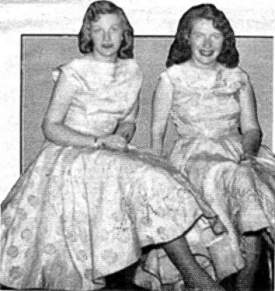 Skeeter & Betty Davis |
They were
signed by Steve Sholes, and in early 1953 recorded first single, I
Forgot More Than You'll Ever Know backed with Rock-A-Bye Boogie.
It rose to #1 on the country charts and remained there for eight weeks
after selling a million copies.
The B-side is a pre-rockabilly classic and Davis' most collectible item.
No sooner than they'd established themselves, tragedy struck that summer
when Betty Jack Davis was killed in a car crash on the way back from WWVA.
Skeeter was also critically injured.
The loss of her friend and singing partner caused her doubts about continuing
in show business.
But at the urging of friends, she teamed with Betty Jack's sister, Georgia
(whom she called Georgie) and they continued on as the Davis Sisters.
The new duo recorded more than 10 RCA 45s together but by 1956 Skeeter
decided to go solo.
ELVIS TOUR
The new duo
had some success, even touring with Opry stars Carl Smith, Hank Snow,
Mother Maybelle Carter and Elvis.
"We didn't open for Elvis, if you can believe that," Davis revealed,
"Hank Snow was the closing act. I have a program: It was Onie Wheeler,
Elvis was second, the Carter Family, the Davis Sisters, then Hank Snow.
Finally, Hank had to let Elvis close the show. It got to where nobody
could follow him. Hank hasn't forgotten it. Every time he sees someone
on the Opry who's driving people crazy he says, "Reminds me of my
days with Elvis Presley."
Skeeter says Presley shared her pre-concert nerves.
"It was something seeing an audience go so completely wild,"
she recalled, "I used to see him backstage biting his fingernails;
he was as nervous as I was. I used to say me and Elvis were both nervous
but he just shook more than I did. He was very insecure. He'd drag me
over into a corner and we'd sing every gospel song we knew. He talked
about his mother a lot. This was right after he made his Sun records and
RCA bought him. He had his pink Cadillac. He had this lace shirt once,
and I said to him, "You're not gonna wear that shirt; it looks like
a blouse." And he said, "You don't like my shirt? I spent every
dollar I had on this." He was so proud of it. He started taking it
off and told me I could have it, but I didn't want his shirt. So Mae Axton,
who wrote Heartbreak Hotel, said, "I'll take that shirt."
She's never let me forget it. But he was really special and I really cared
a lot for him; he was neat. The day before he died he had called Mae Axton
and asked if she'd ever seen me recently, and she said she did, all the
time. He said to tell me hello and everything."
Georgia Davis eventually retired to raise her family, and Skeeter began
a solo career in 1958.
This was not easy as she'd always seen herself as a harmony singer and
had to remind herself she was alone.
CHET
ATKINS
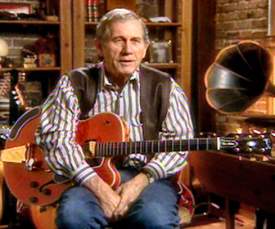 Chet Atkins |
Davis
moved to Nashville to record for RCA with Chet Atkins as her producer. She released singles and built an audience. Her first solo country hit in 1958 was Lost to a Geisha Girl, a song that "answered" Hank Locklin's Geisha Girl from the year before. She joined the Grand Ole Opry in 1959 after her breakthrough with Set Him Free. In 1960, she made her debut on the pop charts with another answer song, I Can't Help You I'm Falling Too, a response to Locklin's Please Help Me, I'm Falling. |
But the past
10 years of successes were nothing compared to 1963's The End Of The
World.
Ironically, radio had been playing the B-side, but when New York City
disc jockey Scott Muni flipped it over and played the sentimental ballad,
Skeeter Davis was on her way to her first across-the-board pop smash.
It reached #2 in Billboard in early '63, won Skeeter several awards (she'd
already been nominated for a number of country Grammys) and remains a
standard today.
However, the song's success caused problems with Davis's country audience
and in the music industry.
She had been a member of the Grand Ole Opry since 1959, but now that she
had a "pop" hit, many country DJs and promoters refused to deal
with her anymore.
At the same time, many of those in the rock 'n' roll or pop segments of
the industry still saw her as a country artist.
CAROLE
KING
Despite that, two singles later Davis scored another pop Top 10 with I
Can't Stay Mad At You, a song written by Carole King and Gerry Goffin.
But that would be Davis's last pop smash.
Goffin and King also wrote another successful girl group knockoff for
her, Let Me Get Close to You, although such efforts were the exception
rather than the rule. Usually she sang sentimental, country-oriented tunes
with enough pop hooks to catch the ears of a wider audience, such as I
Will.
Only three more of her singles reached the Top 100 and by the end of 1964
she bid farewell to the pop charts.
|
Other
Top 10 hits included Set Him Free (1959), My Last Date
With You (1961), Optimistic (1961), Where I Ought
To Be (1962), I'm Saving My Love (1963), Gonna Get
Along Without You Now (1964) and What Does It Take To Keep
a Man Like You Satisfied (1967). "I wasn't trying to be anything other than a country artist," Davis said of her pop hits, "But I was getting to do some shows with people like the Rolling Stones. |
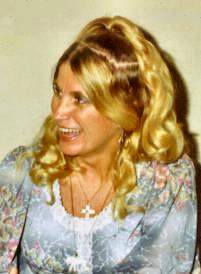 |
It seemed
like all of a sudden the country people didn't want me, and the pop people
didn't want me, and all I was doing was trying to make good records. It
was kinda crazy back then. At the time I was going through a divorce that
was very hard on me. I played the Beatle' records and I asked Chet what
he thought it was about them, and he said it was their hair. I haven't
let him forget that. I met Ringo; he's the only one."
TV AND DUETS
But her career
continued sans pop hits.
Davis performed continuously throughout the 1960s and early '70s in the
U.S. and beyond where she was still a major star.
She visited England, Germany, Japan, Holland, Sweden, Norway, Denmark,
Finland, New Zealand, Virgin Islands, Singapore and Malaysia.
Skeeter earned gold records from South Africa and silver records from
Norway.
In 1983 she was invited to appear in Jamaica with Aretha Franklin, Grateful
Dead, Beach Boys, Peter Tosh and Gladys Knight and the Pips - because
the promoter found out she was a favourite in the Caribbean.
Skeeter also appeared on numerous television programs, including religious
shows such as Oral Roberts' specials.
BUDDY HOLLY
And she continued to record for RCA, adding tribute discs to Buddy Holly and Dolly Parton to her discography.
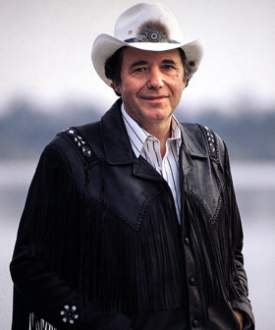 |
There
were also two duet albums with Bobby Bare and others with George Hamilton
IV, Don Bowman, and Porter Wagoner. "I loved Buddy Holly, I was a big fan of his," Davis recalled, "I remember sitting with Ernest Tubb and his band when the tragedy occurred; we were in Iowa. Some of his songs, like True Love Ways, I thought were just me. Felton Jarvis was producing me (in '67) because Chet was sick, and I mentioned my love of Buddy Holly. Waylon Jennings was there and we all started talking about it and the next thing you know, we were doing it. I don't know if Chet would've let me done that or not, but it was right up Felton's alley. We called up the Hollys and they came to the session. It was so nice meeting them and hearing all about Buddy. But there again, they wouldn't play the album. < Bobby Bare |
I went back to RCA when the Buddy Holly Story movie came out, and said, "You know, y'all could make some money if you really want to by reissuing this album and sticking a picture of me on the front." I had learned that my fans were all fussed because they wanted me to be on the cover (it shows a photo of Holly). And they said, "Skeeter, you're grasping at straws."
OPRY BAN
By the time
her RCA contract ended in 1974, Skeeter Davis had logged over 50 singles
and 30 albums for Nipper.
In 1973, the Grand Ole Opry suspended Davis for more than a year after
she criticised the Nashville police during her Opry show for arresting
a group of "Jesus people" at a local mall.
She immediately followed her comments with a rousing rendition of Amazing
Grace.
"I felt so unloved when I got kicked off the Opry," she told
an interviewer. "I'm childlike in many ways. It seems to me like
I've been a rebel all my life, too."
After a couple of years, due in part to the intercession of her friend
Jean Shepard, Skeeter was put back on the Opry.
Skeeter never received an apology for its ban.
MARRIAGE #3
There was
an 11-year recording gap between 1974 and 1985, when a label called Tudor
released an album of unfinished masters.
Davis made her recording comeback with NRBQ - a band that once featured
country hit writer and Carlene Carter guitarist Al Anderson.
"I was playing a concert at a park in Massachusetts," Davis
revealed about the union, "Terry Adams and Tom Ardolino came to the
show. Terry had a big collection of Davis Sisters records and he couldn't
quit talking about them. Even in Nashville, nobody ever talks about the
Davis Sisters, so I thought there was something kinda neat about it all.
I told him that maybe some day he could come and listen to some Davis
Sisters things I had that I'd never played for anybody, which did come
to pass about four years ago. I had had some of their albums but had never
seen them live. So I went to see them, jumped up and sang The End Of
The World, and the next thing you know we were starting an album."
The album She Sings, They Play was released for Christmas 1985,
more than three decades after Davis decided to become a singing star.
Adams loved the harmony singing on the dozen Davis Sisters singles he
owned, a vocal blend that would later influence the Everly Brothers and
many others.
What he didn't realise was that she was the very same Skeeter Davis who
had scored a No. 1 hit in 1963 with the pop ballad The End Of The World.
Once he found out Adams travelled to a county fair to hear her sing.
They spoke about the Davis Sisters that day, and Skeeter mentioned that
she happened to have some unreleased Davis Sisters recordings at home,
and would he like to hear them?
It took some time before their mutually hectic schedules allowed them
to meet again, but before long Davis was joining NRBQ onstage to sing
The End Of The World with them.
Plans were made to record an album.
"There's a song Joey wrote especially for it and one Terry wrote,"
Davis recalled after its release, "and we did some outside material.
We did Things To You, which NRBQ fans are familiar with. We did an old
Bill Carlisle song, Ain't Nice To Talk Like That, which was a hit
in the early '50s, and a few things I wrote. We thought about doing The
End Of The World later, but we weren't really thinking like that when
we were making the album.
CANCER FINALE
When Davis
was diagnosed with cancer at 56 she began a spirited battle.
"People have said, 'Skeeter, we're going through this journey with
you, we're praying for you.'" Davis revealed in 1997.
"The illness cost me my marriage, so I'm divorced - not quite a year
yet."
But the disease, divorce and varying medical reports often tested Skeeter's
faith.
"I was crying out. My marriage was broken, I was fighting the disease
and going in for tests and I prayed, 'Lord, restore and renew my faith
to the same faith I had when I was a little 10-year-old girl crying in
a barn."
Ironically, Davis's funeral service was held at the Ryman Auditorium -
original home of the Grand Ole Opry that banned her in 1973 - on Wednesday
September 22.
DISCOGRAPHY - A L B U M S
Title Year/Label/Format
I'll Sing You A Song And Harmonize Too - 1960
Skeeter Davis - 1961
Here's The Answer -1961
Porter Wagoner And Skeeter Davis Sing Duets - 1962
The End Of The World - 1963
Cloudy, With Occasional Tears - 1963
I Forgot More Than You'll Ever Know - 1964
Authentic Southern Style Gospel - 1964
Let Me Get Close To You - 1964
The Best Of Skeeter Davis - 1964
Tunes For Two (with Bobby Bare) - 1965
Blueberry Hill And Other Favourites - 1965
Written By The Stars - 1965
Skeeter Sings Standards - 1965
You've Got A Friend
Singin' In The Summer Sun - 1966
My Heart's In The Country - 1966
Hand In Hand With Jesus - 1967
What Does It Take (To Keep A Man Like You Satisfied) - 1967
Skeeter Davis Sings Buddy Holly - 1967
Why So Lonely? - 1968
I Love Flatt & Scruggs - 1968
Funny Folks' Flops - 1968
The Closest Thing To Love - 1969
Mary Frances - 1969
A Place In The Country - 1970
Your Husband, My Wife (with Bobby Bare) - 1970
It's Hard To Be A Woman - 1970
Easy To Love - 1970
Skeeter - 1971
Love Takes A Lot Of My Time - 1971
Foggy Mountain Top - 1971
Skeeter Sings Dolly - 1972
Bring It On Home - 1972
The Hillbilly Singer -1973
I Can't Believe That It's All Over - 1973
Best Of Skeeter Davis Volume 2 - 1973
He Wakes Me With A Kiss Every Morning - 1974
Best Of The Best Of Skeeter Davis - 1978
Heartstrings - 1983
Live Wire - 1984
20 Of The Best - 1985
She Sings, They Play (with NRBQ) - 1985
Skeeter Davis Best Selection - 1989
You Were Made For Me (with Teddy Nelson) - 1990
Memories (The Davis Sisters) - 1993
The Essential - 1996
The Ultimate Collection - 1998
RCA Country Legends - 2001
